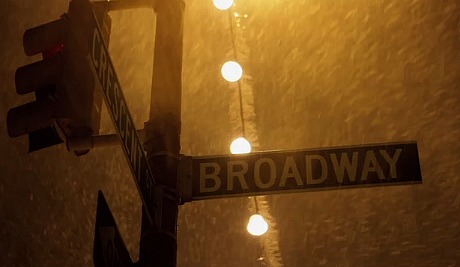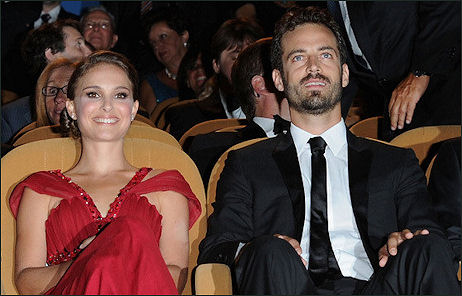I’m feeling less dispirited about 2011 now that I’ve tallied everything up. I’m looking at 42 films that will almost certainly intrigue and perhaps more than that — 9 from top-grade filmmakers (whose films seem the most likely Best Picture candidates at this stage), 27 that are promising maybes at the least, and 6 that will most likely qualify as “entertaining,” however you want to define that. Here’s hoping that other surprises turn up. Corrections and suggestions are welcome.
Major League (9):
The Descendants (d: Alexander Payne). Cast: George Clooney, Judy Greer, Beau Bridges, Matthew Lillard, Shailene Woodley, Robert Forster, Michael Ontkean, Mary Birdsong. Synopsis: Indifferent husband & father of two girls Matt King (Clooney) considers his past and future when his wife suffers a boating accident off of Waikiki, and debates whether to sell or not sell the family’s land handed down from Hawaiian royalty and missionaries, etc.
The Girl With The Dragon Tattoo (d: David Fincher). Cast: Rooney Mara, Daniel Craig, Christopher Plummer, Stellan Skarsgard, Robin Wright, Joely Richardson, Steven Berkoff. Synopsis unnecessary.
The War Horse (d: Steven Spielberg). Cast: Jeremy Irvine, Tom Hiddleston, David Thewlis, Emily Watson, Peter Mullan, Benedict Cumberbatch, Toby Kebbel Synopsis: HE War Horse riff posted on 5.4.10.
The Tree of Life (d: Terrence Malick). Cast: Brad Pitt, Sean Penn, Jessica Chastain, Joanna Going, Fiona Shaw. Celestial cosmic pondering of the pain and general shittiness of things, considering what brutal fathers do to their sons, etc.
The Ides of March (d: George Clooney). Cast: Ryan Gosling, George Clooney, Marisa Tomei, Evan Rachel Wood, Paul Giamatti, Philip Seymour Hoffman, Max Minghella, Jeffrey Wright. Synopsis: :Political drama about an idealistic staffer working for a presidential candidate getting a crash course on dirty politics,” etc. Based on the play by Beau Willimon.
Young Adult (d: Jason Reitman, w: Diablo Cody). Cast: Charlize Theron, Patrick Wilson, Elizabeth Reaser, Collette Wolfe, Patton Oswalt. Synopsis: “A divorced writer from the Midwest returns to her hometown to reconnect with an old flame, who’s now married with a family,” etc.
We Bought A Zoo (d: Cameron Crowe, w: Crowe, Aline Brosh Mckenna). Begins shooting in early ’11. Cast: Matt Damon, Scarlett Johansson, Elle Fanning, Patrick Fugit, Thomas Haden Church, Angus Macfadyen, Colin Ford. Synopsis: A father moves his family to the English countryside to own and operate a zoo.
Moneyball (d: Bennett Miller). Cast: Brad Pitt, Jonah Hill, Robin Wright, Philip Seymour Hoffman, Chris Pratt, Tammy Blanchard. Synopsis: “The story of Oakland A’s general manager Billy Beane’s successful attempt to put together a baseball club on a budget, by employing computer-generated analysis to draft his players.”
Extremely Loud and Incredibly Close (d: Stephen Daldry, w: Eric Roth). Cast: Tom Hanks, Sandra Bullock, Thomas Horn. Synopsis: “A nine-year-old searches New York for the lock that matches a key left by his father when he was killed in the 9.11 attacks,” etc.
Qualified Expectations (27):
Larry Crowne (d: Tom Hanks). Cast: Tom Hanks, Julia Roberts, Bryan Cranston, Nia Vardalos, Pam Grier. Synopsis: “After losing his job, a middle-aged man reinvents himself by going back to college,” etc. A variation of this idea found form as High Time (’60), a Bing Crosby movie about a successful resturateur who decides to go to college at age 51.
Hugo Cabret (d: Martin Scorsese). Cast: Asa Butterfield, Chloe Moretz, Jude Law, Richard Griffiths, Emily Mortimer, Ben Kingsley, Sacha Baron Cohen, Christopher Lee, Ray Winstone, Michael Stuhlbarg. Synopsis: “Set in 1930s Paris, an orphan who lives in the walls of a train station is wrapped up in a mystery involving his late father and an automaton,” etc.
Nanjing Heroes (d: Zhang Yimou). Cast: Christian Bale. Synopsis: “Chinese sex workers in 1937 volunteer to replace university students as escorts for invading Japanese soldiers,” etc.
Contagion (d: Steven Soderbergh). Cast: Matt Damon, Marion Cotillard, Gwyneth Paltrow, Kate Winslet, Jude Law, Bryan Cranston, Laurence Fishburne, Jennifer Ehle, John Hawkes. Synopsis: “Action-thriller centered on the threat posed by a deadly disease and an international team of doctors contracted by the CDC to deal with the outbreak,”etc.
Haywire (d: Steven Soderbergh, w: Lem Dobbs). Cast: Gina Carano, Channing Tatum, Michael Fassbender, Ewan McGregor, Michael Douglas, Antonio Banderas, Bill Paxton, Mathieu Kassovitz . Synopsis: “A black ops super soldier seeks payback after she is betrayed and set up during a mission,” etc.
Straw Dogs (d: Rod Lurie). Cast: James Marsden, Kate Bosworth, Alexander Skarsg√•ard, James Woods, Dominic Purcell, Willa Holland. Synopsis: Remake of Sam Peckinpah‘s 1971 classic, this time about an “L.A. screenwriter relocating with his wife to her hometown in the deep South” where a brewing conflict with locals turns creepier and scarier. Endlessly delayed.
The Beaver (d: Jodie Foster). Cast: Mel Gibson, Foster, Jennifer Lawrence, Anton Yelchin. Synopsis unnecessary
Water for Elephants (d: Francis Lawrence). Cast: Robert Pattinson, Reese Witherspoon, Christoph Waltz, Hal Holbrook. Synopsis: “A veterinary student abandons his studies after his parents are killed and joins a traveling circus as their vet,” etc.
On The Road (d: Walter Salles). Cast: Garrett Hedlund, Kristen Stewart, Sam Riley, Amy Adams, Steve Buscemi, Kirsten Dunst, Viggo Mortensen, Terrence Howard, Alice Braga.
A Dangerous Method (d: David Cronenberg). Sigmund Freud (Viggo Mortensen) vs. Carl Jung (Michael Fassbender). Costars: Keira Knightley, Vincent Cassel.
Tinker, Tailor, Soldier, Spy (d: Thomas Alfredson). Cast: Gary Oldman, Tom Hardy, Colin Firth, Mark Strong, Stephen Graham, Benedict Cumberbatch, Ciaran Hinds, Christian McKay. Synopsis: “In the bleak days of the Cold War, espionage veteran George Smiley is forced from semi-retirement to uncover a Soviet agent within MI6’s echelons,” etc.
Jane Eyre (d: Cary Fukunaga). Cast: Mia Wasikowska, Michael Fassbender, Jamie Bell, Judi Dench, Imogen Poots, Sally Hawkins. Synopsis: “A mousy governess who softens the heart of her employer soon discovers that he’s hiding a terrible secret,” etc.
My Week With Marilyn (d: Simon Curtis). Cast: Michelle Williams, Kenneth Branagh, Eddie Redmayne, Emma Watson, Judi Dench, Dougray Scott, Julia Ormond, Dominic Cooper, Derek Jacobi. Synopsis: The experience of Colin Clark (Redmayne), an employee of Sir Laurence Olivier’s, about the tense interaction between Olivier and Marilyn Monroe during production of The Prince and the Showgirl,” etc.
The Whistleblower (d: Larysa Kondracki). Cast: Rachel Weisz, Monica Bellucci, Benedict Cumberbatch, Vanessa Redgrave, David Strathairn, David Hewlett. Synopsis: “A drama based on the experiences of Kathryn Bolkovac, a Nebraska cop who served as a peacekeeper in post-war Bosnia and outed the U.N. for covering up a sex scandal,” etc.
Wuthering Heights (d: Andrea Arnold). Cast: James Howson, Kaya Scodelario, Nichola Burley, Oliver Milburn, Steve Evets, Amy Wren. Synopsis: Cathy, Heathcliff, Emily Bronte, etc.
The Skin That I Inhabit (d: Pedro Almodovar). Cast: Antonio Banderas, Elena Anaya, Marisa Paredes, Eduard Fern√°ndez, Barbara Lennie, Fernando Cayo. Synopsis: A plastic surgeon on the hunt for the men who raped his daughter, based on Thierry Jonquet‘s novel ‘Mygale’,” etc.
We Need To Talk About Kevin (d: Lynne Ramsay). Cast: Tilda Swinton, John C. Reilly, Ezra Miller, Siobhan Fallon. Synopsis: “The mother of a teenage boy who went on a high-school killing spree tries to deal with her grief — and feelings of responsibility for her child’s actions — by writing to her estranged husband,” etc.
Rampart (d: Oren Moverman). Cast: Steve Buscemi, Robin Wright, Sigourney Weaver, Woody Harrelson, Ben Foster, Brie Larson. Synopsis: “Veteran police officer Dave Brown struggles to take care of his family, fights for his own survival,” etc.
Source Code (d: Duncan Jones) Cast: Jake Gyllenhaal, Michelle Monaghan, Vera Farmiga, Jeffrey Wright. Synopsis: “Soldier who wakes up in the body of an unknown man, discovers he’s part of a mission to find the bomber of a Chicago commuter train,” etc.
Midnight in Paris (d: Woody Allen). Cast: Rachel Mcadams, Michael Sheen, Marion Cotillard, Owen Wilson, Alison Pill, Adrien Brody, Kathy Bates. Synopsis: “Romantic comedy, family visiting Paris for business, young engaged couple dealing with quality-of-life issues,” etc.
Take This Waltz (d: Sarah Polley). Cast: Michelle Williams, Seth Rogen, Sarah Silverman, Aaron Abrams, Luke Kirby. Synopsis: “A woman struggling to choose between two different types of love,” etc. Whatever that means.
At-Swim-Two-Birds (d: Brendan Gleeson). Cast: Cillian Murphy, Michael Fassbender, Colin Farrell , Jonathan Rhys Meyers, Brendan Gleeson, Gabriel Byrne. Synopsis: “A playwright’s life begins to mingle with the fictional characters he’s created,” etc.
Dream House (d: Jim Sheridan). Cast: Daniel Craig, Rachel Weisz, Naomi Watts, Marton Csokas, Claire Geare, Taylor Geare. Synopsis: “Soon after moving into their seemingly idyllic new home, a family learns of a brutal crime committed against former residents of the dwelling,” etc.
The Help (d: Tate Taylor). Cast: Emma Stone, Jessica Chastain, Bryce Dallas Howard, Mike Vogel, Allison Janney, Sissy Spacek, Viola Davis. Synopsis: “’60s period drama, small southern town, three courageous women who strike up an unlikely friendship,” etc.
Albert Nobbs (d: Rodrigo Garcia). Cast: Glenn Close, Aaron Johnson, Mia Wasikowska, Jonathan Rhys Meyers, Brendan Gleeson, Brenda Fricker, Janet McTeer. Synopsis: Cross-dressing drama, late 19th Century Ireland, etc. Shooting this summer, possibly not ready until 2012.
This Must Be The Place (d: Paolo Sorrentino). Cast: Sean Penn, Frances McDormand, Harry Dean Stanton, Shea Whigham, Judd Hirsch, Kerry Condon. Synopsis: “A bored, retired rock star sets out to find his father’s executioner, an ex-Nazi war criminal who is a refugee in the U.S.,” etc.
One Day (d: Lone Scherfig). Cast: Anne Hathaway, Jim Sturgess, Patricia Clarkson, Jodie Whittaker, Georgia King. Synopsis: A reworking of the old Same Time Next Year concept? “Dexter and Emma, who first meet during their graduation in 1988 and proceed to reunite one day each year for the next 20 years,” etc.
Elite Popcorn (6):
Cowboys & Aliens (d: Jon Favreau). Cast: Daniel Craig, Harrison Ford, Olivia Wilde, Olivia Wilde, Sam Rockwell, Noah Ringer, Paul Dano, Ana de la Reguera, Clancy Brown, Keith Carradine. Synopsis: “A spaceship arrives in Arizona, 1873, to take over the Earth, starting with the Wild West region…a posse of cowboys are all that stand in their way,” etc.
Paul (d: Gregory Mottola). Cast: Simon Pegg, Jane Lynch, voice of Seth Rogen, Kristen Wiig, Sigourney Weaver. Jason Bateman, Blythe Danner, Bill Hader. Synopsis: “Two British comic-book geeks traveling across the U.S. encounter an alien outside Area 51,” etc.
Red Riding Hood (d: Catherine Hardwicke). Cast: Amanda Seyfried, Lukas Haas, Gary Oldman, Virginia Madsen, Michael Shanks, Julie Christie. Synopsis: “Set in a medieval village that is haunted by a werewolf, a young girl falls for an orphaned woodcutter, much to her family’s displeasure,” etc.
Hobo With A Shotgun (d: Jason Eisener).
Super 8 (d: J.J. Abrams). Cast: Elle Fanning, Noah Emmerich, Amanda Michalka, Kyle Chandler, Ron Eldard, Zach Mills. Synopsis: Some kind of spooky creepy neo-Spielbergean thing.
Hanna (d: Joe Wright). Cast: Saoirse Ronan, Cate Blanchett, Eric Bana, Olivia Williams, Tom Hollander. Synopsis: “A 14-year-old who was raised by her father to be a cold-hearted killing machine connects with a French family who look to help ease her into a more conventional life,” etc.






